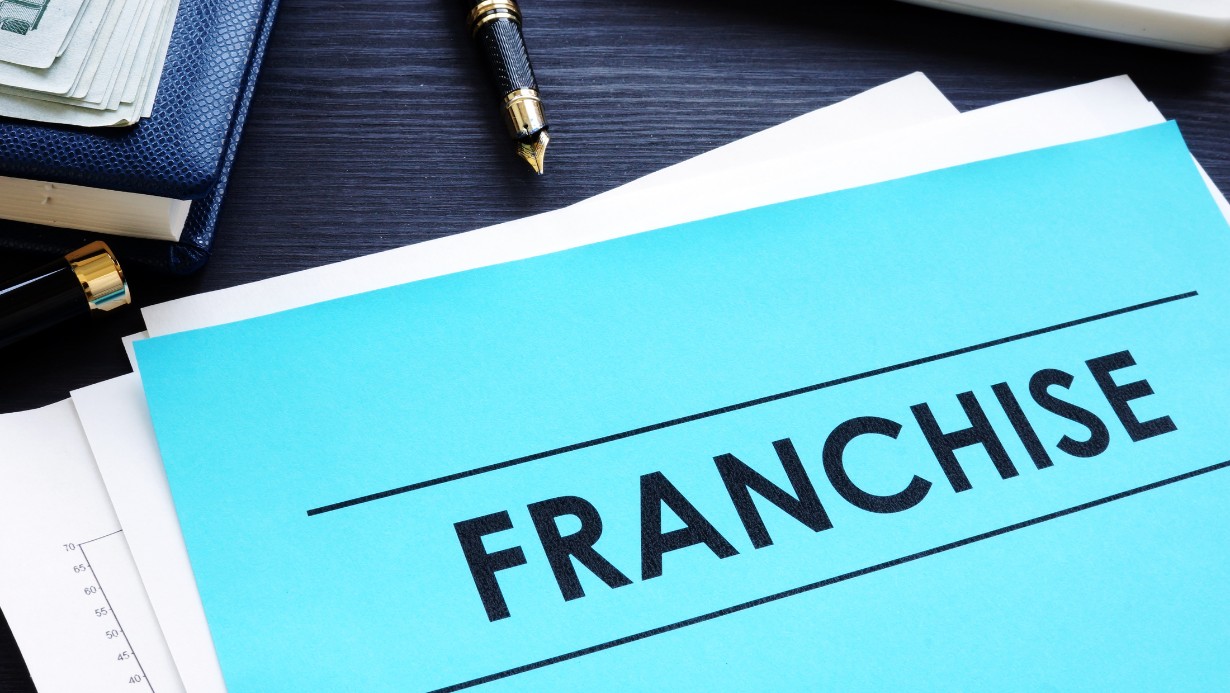Ready to Embark on an Exciting Journey with WIN?
Take the first step toward personal and financial freedom by filling out the interest form. One of our franchise advocates will be in touch with you soon!

Owning a franchise is an exciting opportunity for aspiring entrepreneurs who want the security and support of an established brand while still enjoying the independence of running their own business. Franchise ownership allows these individuals to take control of their careers by leveraging a proven business model, receiving valuable training, and benefiting from ongoing support. This combination of autonomy and assistance makes franchise ownership an attractive option for those looking to reduce the risks typically associated with entrepreneurship. As franchises continue to grow in popularity, more and more individuals are choosing this business model as their path to success. With a strong support system, it’s easier to build a successful business when you can rely on the experience and systems that have been developed and perfected over time by the parent company.

A franchise is a business model in which an individual (the franchisee) purchases the rights to operate a business using the brand, products, and systems developed by another entity (the franchisor). In exchange for an initial investment and ongoing fees, the franchisee receives the ability to run their own business under an established brand name. This allows them to benefit from the brand’s reputation and proven processes, while the franchisor gains expansion into new markets through their network. The franchise business model provides an easier entry point into entrepreneurship, allowing individuals to focus more on operations and growth rather than starting from scratch with market establishment.
The relationship between the franchisor and the franchisee is one of mutual support and shared goals. The franchisor provides the framework for the business and in return, the franchisee is responsible for managing the day-to-day operations, maintaining the brand’s standards, and ensuring profitability. It’s a collaborative partnership where both parties work toward mutual success. The success of a franchise is heavily dependent on this cooperation, with franchisees relying on the franchisor’s experience while ensuring they uphold the brand’s quality.
Franchises come in many forms and span many industries. Some of the most common types include food and beverage franchises (such as fast-food chains), retail franchises (like clothing or convenience stores), and service-based franchises (such as home inspection services). Each industry offers different opportunities and challenges, so it’s important for potential franchise owners to choose an industry that aligns with their personal interests and expertise. Choosing an area you are passionate about and have extensive knowledge in will make the ownership experience much more fulfilling and set you up for long-term success.

The biggest advantage of franchise ownership is the reduced risk. Starting a business from scratch means building everything from the ground up, like branding, customer bases, operational systems and marketing strategies. But with a franchise, these elements are already in place, providing franchisees with a strong foundation from day one. This allows franchisees to focus on optimizing their business rather than spending valuable time and resources developing everything from scratch. The business model has already been tested, which means you can start running the business much faster and with confidence.
» See: Franchise vs. Independent Business: Making the Right Choice For You
When you purchase a franchise, you’re buying into a well-known brand with a loyal customer base. This brand recognition significantly reduces the time it takes to attract customers, who already know what they’re getting. The name and reputation already carry weight in the marketplace, making it easier to build that credibility. In addition, franchisors provide a tried-and-tested business model, and the playbook for success is essentially already written. Franchisees are handed a roadmap that includes marketing strategies, sales techniques and management protocols.
» See: Why Join a Franchise with a National Brand?
Franchisees are not left to figure problems out on their own. One of the most valuable aspects of franchise ownership is the ongoing support provided by the franchisor. This includes initial training that covers everything from business management to marketing, as well as continuous assistance in areas such as operations and customer service. Many franchisors also provide marketing collateral and national advertising campaigns to drive traffic to your business. This level of support ensures franchisees have the tools and resources they need to thrive.
» See: How to Evaluate a Good Franchise Training Program
As a result of support from an established brand, franchise businesses tend to have a much lower failure rate compared to independent startups. Franchises come with built-in systems, brand recognition, and a support network, all of which contribute to long-term stability. Entrepreneurs looking to minimize risk often find that franchise ownership offers a reliable and proven pathway to success with a structured support system.

Before committing to any franchise, it’s essential to conduct thorough research. Start by analyzing which industries are growing and identifying trends that align with your strengths and interests. Do you find serving food or inspecting a home more intriguing? Consider whether you’re more suited to a retail franchise, a service-oriented business or another type of operation entirely. Exploring industries that show resilience or growth potential, such as home inspection services, health and wellness or fast-casual dining, can lead to a more secure investment. It’s also important to assess whether your skill set and background match the operational requirements of the franchise you’re considering.
» See: How to Choose the Best Franchise Opportunity for You
Once you’ve identified a few potential franchises, the next step is to evaluate each option carefully. This process involves looking over a company’s Franchise Disclosure Document (FDD), which details important information about the franchise’s financials, obligations, and operations. Pay attention to the reputation, market demand, training and support systems, as well as the total investment required on your end. This includes both the initial franchise fees and ongoing royalty fees. A thorough understanding of the FDD ensures you’re selecting the best fit for your personal goals and financial situation.
Franchise consultants can offer valuable insights into various opportunities, helping you navigate the decision-making process. In addition to consultants, talking to current franchisees can provide that critical, real-world perspective on what it’s like to run the business. Consider asking franchisees about their experience with the franchisor’s support, challenges they’ve faced, and the financial performance of their location. These conversations can provide a clearer picture of what to expect and can help you avoid any pitfalls that others may have encountered.
After gathering all the necessary information, you’ll need to narrow down your choices and make that final call. This is where you align your personal goals, financial capabilities, and industry interests with the right franchise opportunity. Consider factors like the franchise’s track record, its future growth potential, and how well it fits with your lifestyle and long-term goals. You should feel confident that the franchise you choose will provide a solid return on investment while aligning with your professional aspirations.

As mentioned, the first step in becoming a franchise owner is conducting initial research and self-assessment. Consider how much time you are willing to dedicate to the business, and whether you are comfortable following that established system. It’s important to assess your willingness to manage a team, follow a franchisor’s established processes, and invest both time and resources into a long-term venture.
Once you’ve identified a potential franchise, reach out to the franchisor for more information. Ask questions about the initial investment, training programs, and ongoing support systems. Understanding the level of assistance you’ll receive from the franchisor is critical to your decision-making process. Some franchises provide more comprehensive care or have larger support teams than others, so it’s important to find a partner whose management aligns with your needs and expectations as a new franchisee.
The FDD is an extremely important document you’ll review during the franchise buying process. It provides critical information about the franchise’s legal and financial details, including any red flags to watch for. Pay close attention to the franchise’s obligations, royalties, any litigation history, and any restrictions or limitations that could affect your business. Consulting with an attorney who specializes in franchise law can also help you navigate the complexities of the FDD and ensure that you fully understand your legal rights before proceeding further with negotiations.
Securing the funds to purchase a franchise is often one of the most challenging steps. There are a variety of financing options, from bank loans to third-party investments, but the key lies in finding the option that works best for you with diligent research. The choice of partner comes into play here as well. Some franchisors offer special discounts on initial fees to veterans or first responders, for instance.
Once financing is secured, you’ll sign the franchise agreement, which outlines the legal terms of your relationship with the franchisor. Be sure to seek legal counsel to fully understand the agreement and your obligations. This document governs everything from your use of the brand’s name and systems to the royalties you’ll pay and the level of support you’ll receive. It’s crucial that you fully understand the terms of the negotiation before committing, as it will guide your every operation moving forward.
Setting up your franchise includes selecting a location and negotiating a lease (if it requires a storefront), ordering inventory and supplies (if applicable), and hiring and training staff. The setup process can vary depending on the type of franchise, but generally includes preparing the site for operation, obtaining the necessary permits and establishing relationships with key suppliers of goods or customers. You’ll also work closely with the franchisor to set up marketing efforts and plan your launch. While the franchisor will provide guidance during this phase, it’s ultimately up to you to execute the plans and manage the logistics effectively. The set-up phase can be demanding, but with proper planning and the support of an involved franchisor, you’ll be well-prepared for a successful launch.

The initial franchise fee is an upfront cost you pay to gain access to the brand’s name and systems. This fee can range anywhere from a few thousand dollars to several hundred thousand, depending on the company and industry. Typically, it covers the cost of initial training, use of proprietary business models and marketing support. The franchise fee is a necessary investment to secure the rights to operate under the brand, and it’s important to understand exactly what is included in this fee before proceeding.
Franchisees are required to pay ongoing royalties, which are often calculated as a percentage of their gross sales. These royalties contribute to the franchisor’s continued support and the maintenance of their brand. Additionally, many franchisors require their locations to contribute to a national or regional advertising fund, which supports marketing efforts on a broader scale.
Beyond the initial franchise fee and royalties, you’ll need to account for other startup costs, such as equipment, inventory, real estate and build-out expenses. Depending on the type of franchise, these costs can vary greatly. For example, a restaurant franchise may require significant investment in kitchen equipment and interior design, while a home inspection service may need advanced tools. It’s important to budget carefully for all aspects of opening your franchise, including potential unexpected expenses that may arise during this set-up phase. Be sure to ask the franchise you’re investing in if there are any hidden costs, such as additional marketing or training costs.
Financing options for franchise ownership include bank loans, Small Business Administration (SBA) loans, and sometimes franchisor-sponsored financing. Some franchisors partner with third-party lenders to offer financing assistance to franchisees, making it easier to secure the capital needed to start your business. It’s essential to explore all available options, including personal savings, loans and investor partnerships, to determine which ones best suit your financial situation and long-term goals. Researching different financing sources can help you secure the best terms and reduce your financial burden.
If you’re a veteran, you’ll likely have access to additional funding options including loan programs tailored to veteran entrepreneurs, such as the Veterans Advantage Loan Program, and grants. Some franchises will also offer discounts on franchise fees and start-ups costs to veterans.
The costs associated with buying a franchise can vary widely depending on the industry. For instance, a low-cost service franchise may have minimal upfront expenses, while a restaurant franchise may require significant investment in equipment, real estate, and staffing. It’s important to understand the cost structure within the industry you’re entering, as this will impact your initial investment and profit margins. For those on a budget, some service operations or mobile businesses offer a more affordable entry point into business ownership.
When calculating your budget, be sure to account for the sneaky hidden costs such as legal fees, additional training, or even unforeseen expenses like equipment repairs or building modifications. These costs can add up over time, so it’s important to build a financial cushion to cover any unexpected expenses. Additionally, understanding the full scope of your financial obligations and liabilities will help you avoid any unpleasant surprises later on, so it’s especially important to pore over the Franchise Disclosure Document.
» See: What Are the Costs Associated with Operating a Franchise

Once your franchise is up and running, focus on growth strategies to increase revenue and expand your customer base. This can include diversifying your product or service offerings, increasing local advertising efforts, and improving operational efficiency. Staying proactive and continually seeking opportunities for growth will also help ensure long-term success. As you gain experience, you may find new ways to streamline operations and offer innovative services that differentiate your business from competitors. It’s important to work with a franchise that offers a wide variety of services or offerings and stay in communication with your franchisor as they implement new strategies across their network as well.
Successful franchise owners never stop learning. As market conditions change, it’s important to adapt and stay ahead of industry trends. Attend ongoing training sessions offered by the franchisor, participate in conferences and networking events, and stay informed about new developments in your industry. Continuous improvement is key to sustaining success in a competitive business landscape, and staying on top of the knowledge base allows you to make strategic decisions to keep your business relevant and profitable.
Your relationship with the franchisor plays a crucial role in your success as a franchise owner. Regular communication and adherence to brand standards will help maintain a positive relationship with the central management. A strong relationship ensures you also receive ongoing support and guidance as your business grows. Building trust with the franchisor can even open the door to additional opportunities, such as participating in pilot programs or testing new products.
As you gain experience and confidence as a franchise owner, you may want to explore multi-unit ownership or expansion into new territories. Many successful franchisees grow their businesses by opening additional locations or diversifying their offerings within the franchise network. Expansion can increase your revenue potential and establish you as a standout player within the franchisor’s system. Franchise owners with a proven track record of success can negotiate even more favorable terms for additional units.
Overall, becoming a franchise owner is a rewarding journey, combining the independence of business ownership with the security of a proven business model. By choosing the right franchise, engaging in due diligence, and following the steps outlined here, you’ll be well-equipped to launch and grow your business. With the right support and an internal commitment to success, franchise ownership can provide a clear path to financial stability and personal fulfillment. Whether you’re just starting out or looking to expand, franchise ownership offers a unique opportunity to build a thriving business while benefiting from the expertise and experience of a larger company.